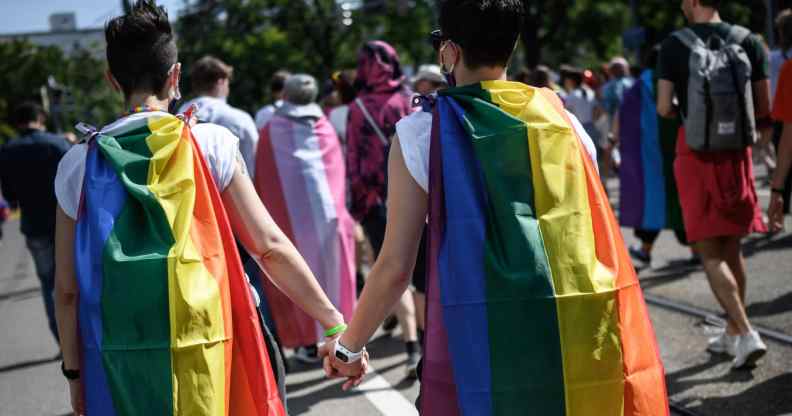Overwhelming majority of Switzerland agrees that gender isn’t binary, encouraging study finds

Zurich Pride on September 4, 2021. (FABRICE COFFRINI/AFP via Getty Images)
Switzerland has an encouragingly nuanced perception of gender, according to a new poll, with more than eight in 10 Swiss people agreeing that there are more than two genders.
Just 18 per cent of people are convinced that there are “only men and women”, according to research based on a survey of nearly 2,700 Swiss residents that was carried out by the Sotomo research institute on behalf of the Gender Equitable platform.
The research found that while most people identified as men or women, the idea of non-binary identities is becoming an increasingly mainstream concept.
Despite an overwhelming number of respondents seeing themselves as clearly male or female – 99.6 per cent – the survey found that people’s perception of gender is increasingly nuanced, with only 14 per cent of men considering themselves “exclusively male” and just six per cent of women saying they are “exclusively female”.
Twelve per cent of people surveyed said they are equally feminine and masculine.
The researchers also looked into how important gender is, finding that a person’s political leanings influence the importance of their own gender to them.
While 55 per cent of respondents said that gender is important or very important for their own identity, among men there was an ideological divide. Sixty-tow per cent of right-wing men said being a man is important to them, while only 12 per cent of left-wing men said the same.
Women found gender more important than men did, with 60 per cent of female respondents admitting that gender “shapes who they are”, compared with 49 per cent of men.
Non-binary awareness growing as Switzerland brings in self-ID for trans citizens
The research revealing an increasingly nuanced and complex understanding of gender in Switzerland comes just days before the country plans to bring in legal gender recognition for trans citizens by self-declaration.
Under the new law, which will go into effect on Saturday (1 January), anyone over the age of 16 and not under legal guardianship will be able to change their gender marker and legal name by self-declaration at a civil registry office.
Current rules on changing gender markers vary by region in Switzerland, but many often require a certificate from a medical professional confirming a person’s trans identity, according to Reuters.
Some require a person to undergo gender-affirming surgery or hormone treatment to legally change gender. If a trans person wants to change their name, some regions require proof that the chosen name has been unofficially used for several years.
The move to strengthen trans rights comes months after Switzerland approved marriage equality in a historic referendum, with same-sex couples being able to get married from July 2022.

